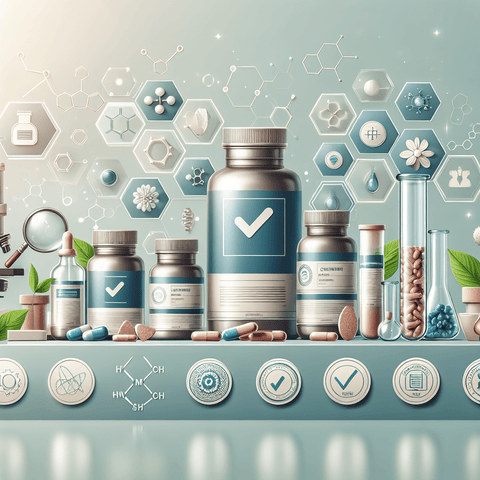Introduction
The global health and wellness movement has seen an unprecedented rise in recent years. Increasing numbers of consumers are actively taking control of their health, exploring dietary supplements as a convenient way to support balanced nutrition. From vitamin C for immune support, vitamin D for bone health, to omega-3 supplements for heart and brain function — the choices seem endless.
However, with a booming supplement industry comes heightened concerns regarding product quality, safety, and accuracy in labeling. Unlike pharmaceutical products, which are subject to rigorous pre-market testing, dietary supplements in many regions are regulated with more leniency. This regulatory gap can result in inconsistencies between what's listed on a supplement’s label and what is actually inside the bottle.
This is where third-party testing in supplements becomes crucial. It serves as a vital safeguard ensuring that the product you’re about to consume is both safe and effective. In simple terms, third-party testing refers to the process in which an independent organization evaluates a supplement for quality, safety, purity, and label accuracy — free from influence by the manufacturer. This blog post will explore what third-party testing really entails, how it works, and most importantly, why it's essential for your health and your ability to make informed supplement choices.
Third-Party Testing: The Gold Standard for Supplement Transparency
Third-party testing, often referred to as independent testing, is the gold standard in the nutritional supplement industry when it comes to ensuring transparency, integrity, and consumer safety. Unlike in-house quality control or manufacturer self-testing, third-party testing is conducted by neutral laboratories with no vested interest in the product’s success. Their role is simple yet vital: verify that the supplement contains what it claims and nothing it shouldn't.
Several independent organizations have established a trustworthy reputation in the world of supplement testing. These include:
- NSF International – Offers certification for a range of standards including NSF Certified for Sport®, which ensures products are free of substances banned by major athletic organizations.
- United States Pharmacopeia (USP) – Recognized for its rigorous standards in purity and potency, particularly in vitamins and minerals.
- ConsumerLab – Independently purchases and tests dietary supplements to publish results and lab reports for consumers.
What exactly do these third parties test for? The parameters are extensive and scientifically validated, often including:
- Ingredient verification: Ensures label claims match actual contents.
- Dosage accuracy: Confirms the active ingredient concentration corresponds to the labeled amount.
- Detection of contaminants: Screens for heavy metals (like lead, arsenic), pesticides, solvent residues, and microbial content.
- Purity check: Confirms the absence of adulterants or undeclared substances.
This rigorous verification brings peace of mind to consumers. When a product is third-party tested, you can trust its integrity, which leads to informed decision-making and reduced health risks. This is particularly important for individuals relying on supplements for specific dietary or health needs, where consistency and quality are non-negotiable.
Supplement Quality: Why It Starts with Verified Ingredients
When discussing supplement quality, the conversation often veers toward marketing claims or branded packaging. But beyond the glossy exterior lies the core of what defines supplement quality: scientifically verified ingredients. True supplement quality is a composite of several key factors — potency, purity, bioavailability, and ethical ingredient sourcing.
Many consumers mistakenly assume that if a supplement is available on a trusted retail site or labeled “natural,” it must be high-quality. Unfortunately, this is not guaranteed. There are documented cases in which supplements contained fewer active ingredients than claimed, or were contaminated with harmful substances. This discrepancy poses direct health risks, particularly when consumers rely on these supplements to fill nutritional gaps or support specific health functions.
Third-party testing offers a powerful safeguard here. By using independent laboratories to verify ingredient identity and concentration, supplement brands can offer proof that what's on the label is backed by science. This includes quantifying vitamins such as C, D, and K, essential minerals like magnesium, and long-chain fatty acids such as DHA and EPA — all staples of the Topvitamine.com supplement catalogue.
Consider a real-world example. In 2019, several weight-loss supplements sold across major online marketplaces were recalled due to undeclared pharmaceutical ingredients, which could pose significant health threats. In another case, a prenatal vitamin was found to contain dangerously high levels of vitamin A, exceeding EFSA’s tolerable upper intake level. These safety lapses could have been prevented with rigorous third-party oversight.
On the other side of the spectrum, brands that consistently engage in third-party testing often market their products with transparent Certificates of Analysis (COAs). This not only strengthens brand integrity but also ensures better health outcomes for consumers by promoting consistency in nutrient delivery, improving absorption through verified bioavailability, and avoiding potentially harmful contaminants.
Independent Lab Testing: How Unbiased Analysis Protects Your Health
When a product undergoes independent lab testing, the primary goal is eliminating bias. Unlike in-house manufacturer testing, where there may be conflicts of interest or commercial pressure, independent labs operate under stringent protocols to remain impartial. Their accountability lies solely with scientific integrity and consumer safety.
Accredited labs — most of which follow ISO/IEC 17025 standards — are equipped to assess a broad array of quality parameters. These include:
- Heavy metal screening: Lead, mercury, cadmium, and arsenic are monitored for compliance with EFSA maximum levels.
- Microbial contamination: Tests for Salmonella, E. coli, and other pathogens that compromise product safety.
- Ingredient authenticity: This is especially critical in botanicals, where visual inspection is not sufficient to validate the presence of the correct plant species.
Another layer of consumer protection comes through analyzing residual solvents (used in botanical extraction), pesticide residues in plant-based supplements, and allergens like gluten or soy that require clear labeling. Labs disclose their findings in lab reports that are sometimes made publicly available by quality-conscious brands.
How can you as a consumer evaluate these testing reports? Look for:
- Accredited lab logos
- Pass/fail markers for each tested parameter
- Date and batch number matching the supplement package
- A clear indication of compliance with EFSA guidelines
This type of transparency can be decisive when choosing between similar-looking supplements. A magnesium supplement independently confirmed to be free of heavy metals and accurately dosed offers far more consumer confidence than a generic alternative.
For those browsing products like magnesium supplements or multivitamins on Topvitamine.com, always prefer the brands that provide access to third-party test results. It is not just a bonus feature — it is your frontline defense against adulteration and mislabeling.
Supplement Certification: Seal of Trust or Just a Marketing Gimmick?
Consumers are becoming increasingly savvy about wellness, but certifications on supplement bottles can still create confusion. What constitutes real validation, and which secludes itself behind smart branding? Understanding reputable third-party certifications is necessary to distinguish genuine quality from mere advertising jargon.
Some of the most respected third-party certifications include:
- USP Verified: Indicates that the product has passed quality tests for identity, potency, and purity set by U.S. Pharmacopeia.
- NSF Certified for Sport®: Focused on athletes, ensuring no banned substances and verified ingredient lists.
- Informed Choice Certified: Similar to NSF Sport, it targets sports nutrition supplements for drug-tested athletes.
To achieve these approvals, brands must submit samples of their finished products and sometimes undergo surprise audits. Chemical analyses, sourcing records, and manufacturing methods are all put under scrutiny. Reputable certification bodies do not simply rubber-stamp applications — the process is time-intensive, expensive, and requires ongoing compliance.
Compare this with vague label claims like “pharmaceutical grade,” “lab tested,” or “clinically proven.” Unless there’s a linked Certificate of Analysis or reference to a recognized certification body, these terms have little regulatory meaning and can be misleading. Supplement companies can self-label without oversight, and consumers are left to guess what lies behind those claims.
Here are some consumer tips to verify genuine third-party certifications:
- Visit the certifying body’s website to verify the supplement’s listing.
- Request a COA directly from the supplement company.
- Avoid products with only vague claims and no substantiating proof.
Supplements like vitamin K or vitamin D are incredibly popular due to their role in bone and immune support. Choosing certified versions of these ensures not only compliance with health guidelines, but also greater consistency and bioavailability in ingredient delivery — without the risk of hidden or banned substances.
Product Purity Testing: Avoiding Contaminants in Your Supplements
Product purity in supplements refers to the absence of contaminants or unnecessary fillers that pose safety risks or interfere with efficacy. Whether it's heavy metals, pesticide residues, solvents, or microbial growth, the concern over contaminated supplements is not hypothetical — it’s backed by recurring product recalls and regulatory warnings.
Common contaminants in supplements include:
- Heavy metals: Including lead, mercury, arsenic, and cadmium, often found in low-quality herbal or mineral products.
- Pesticide residues: Typically found in plant extracts from poorly regulated supply chains.
- Solvent residues: Leftover chemicals used during extraction processes, especially in botanical or CBD oils.
- Pathogenic microbes: Such as Salmonella, mold, and yeast in poorly manufactured supplements.
Third-party laboratories use mass spectrometry, chromatography, and advanced microbial detection methods to analyze products for these contaminants. These techniques have set safety limits based on guidelines from the EFSA (European Food Safety Authority) and WHO. Even trace levels can prompt a product failure if thresholds are exceeded.
For instance, in 2020, third-party testing from an independent lab showed several imported turmeric supplements (commonly used for joint health) exceeding allowable lead content. These supplements were pulled from shelves after failing international purity standards, which could have been detrimental if consumed regularly over time.
Products on Topvitamine.com are carefully curated to meet strict European standards, and many are supported by verifiable third-party purity testing. This ensures that supplements like vitamins, omega acids, and minerals delivered to your door meet high safety and quality benchmarks. Not only does this protect your health, but it reflects a product’s ethical backbone, from its farm-sourced materials to its finished form.
Unbiased Supplement Reviews: How Third-Party Results Inform Smart Purchases
With endless supplement choices and aggressive marketing campaigns, how can a consumer intelligently navigate the supplement marketplace? The answer lies in combining unbiased third-party reviews with test result data to make informed buying decisions.
Supplement review platforms like ConsumerLab and Labdoor independently purchase products from retail outlets and test them for label accuracy, ingredient quality, and contamination. These unbiased reviews compare products head-to-head and often reveal alarming discrepancies. A supplement making bold strength claims may, in fact, contain only 40% of the labeled dose — a vital piece of information for therapeutic users.
When reading reviews, always look out for the following:
- Clear reference to test results or certifications – Does the review include data or links to COAs?
- Transparency in methodology – Are the test criteria and study parameters outlined?
- Potential conflicts of interest – Avoid reviews backed by the supplement retailer or manufacturer directly.
Also pay attention to red flags: excessive brand loyalty, vague language like “best on the market” without substantiating data, or aggressive upselling tactics. Reliable reviews will reference third-party certifications and direct lab outcomes that support product claims.
Consumers shopping for specialty supplements like omega-3 fatty acids or high-potency vitamin formulations should take advantage of these resources to ensure they invest in supplements that actually deliver on quality, dosage, and safety.
Conclusion: Taking Charge of Your Supplement Choices
Third-party testing in supplements is more than just a quality indicator—it's a necessity in a largely self-regulated industry. As consumers become increasingly health-conscious, they need to ensure the supplements they take daily are genuinely safe, clean, and effective.
This means breaking free from misleading branding and prioritizing products with externally verified data. Supplements that undergo third-party testing provide reassurance that they are free from contaminants, dosed correctly, and true to their labels. Equipped with these insights, shoppers can make educated decisions that align with their health goals and avoid wasting money on ineffective or risky products.
Final tips for choosing tested supplements:
- Check for third-party certifications from recognized bodies like USP, NSF, or Informed Choice.
- Request and review Certificates of Analysis (COAs) whenever possible.
- Evaluate labels for transparency and cross-check ingredients with trusted databases.
- Use trusted companies like Topvitamine.com that prioritize science-backed, certified products.
Your health is a long-term investment — let third-party testing be the foundation of every supplement you choose.
Q&A Section
Q1: What is third-party testing in supplements?
It is independent analysis conducted by unbiased laboratories to verify the safety, purity, and label accuracy of dietary supplements.
Q2: Why is third-party testing important?
It ensures transparency, reduces health risks, and confirms that supplements are free from harmful contaminants and meet label claims for dosage and ingredients.
Q3: What are some trusted third-party certifiers?
NSF International, USP Verified, and ConsumerLab are widely recognized for their rigorous testing and certification of supplement products.
Q4: How can I tell if a supplement is truly third-party tested?
Look for legitimate certifications on the label, refer to the brand’s website for COAs, and verify listings on certifier websites.
Q5: Where can I buy third-party tested supplements?
A good source is Topvitamine.com, which offers a wide range of third-party tested and certified products including vitamin C, D, K, magnesium, and omega-3 supplements.
Important Keywords
- Third-party supplement testing
- Independent lab certification
- Supplement purity testing
- NSF certified supplements
- USP verified
- Safe nutritional supplements
- Vitamin quality assurance
- Unbiased supplement reviews
- Contaminant-free supplements
- Lab-tested vitamins
Next time you shop for supplements, make sure they’re third-party tested — your health depends on it!



